
Old English, Latin Alphabet & Numbers, Rusty Metal lettering
Old English Latin alphabet or Anglo-Saxon Latin alphabet is one of the two scripts of Old English. As a rule, it consisted of 24 letters and was used for writing in the 9th — 12th centuries. Of these, 20 were directly Latin letters, two modifications of the Latin letters (Ææ, Ðð), and two graphemes borrowed from the runic alphabet (Þþ, Ƿƿ).
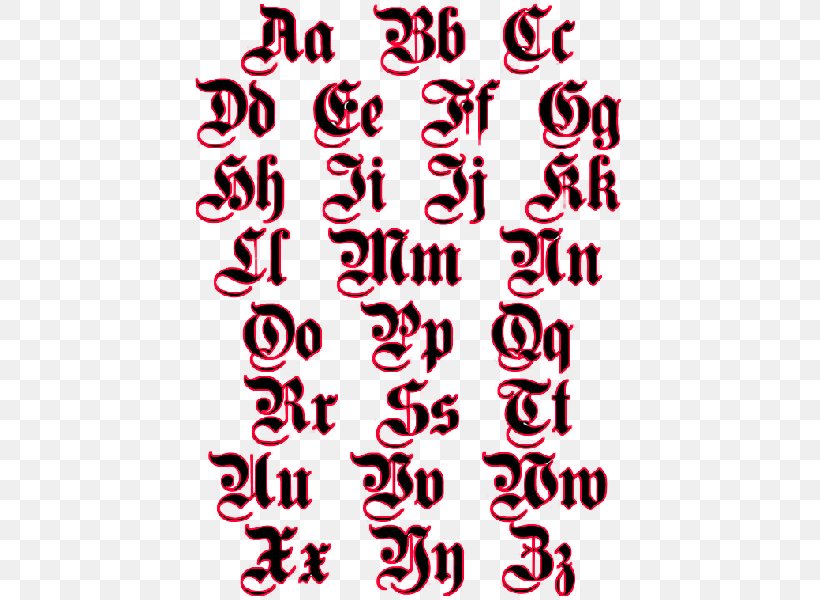
Tattoo Old English Latin Alphabet Letter English Alphabet, PNG, 435x600px, Tattoo, Area, Art
The Old English Latin alphabet generally consisted of about 24 letters, and was used for writing Old English from the 8th to the 12th centuries. Of these letters, most were directly adopted from the Latin alphabet, two were modified Latin letters , and two developed from the runic alphabet . The letters Q and Z were essentially left unused outside of foreign names.

The old english latin alphabet —though it had no standard orthography —generally… Salvabrani
The Duenos inscription, dated to the 6th century BC, shows the earliest known form of the Old Latin alphabet. Archaic Latin alphabet Old Latin alphabet Latin included 21 different characters.
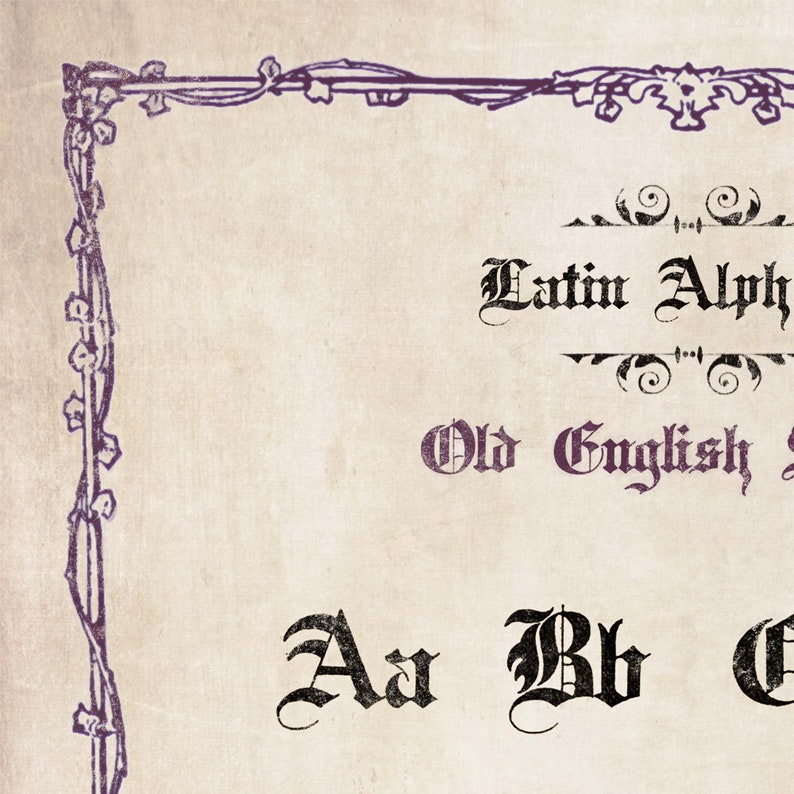
ANTIQUE LATIN ALPHABET Poster Old English Script Etsy
The alphabet used to write our Old English texts was adopted from Latin, which was introduced by Christian missionaries.

Printable Old English Latin Alphabet Old english alphabet, Lettering alphabet, Old english letters
In Old English the letter "r" is pronounced whenever it is written. Ƿ [edit | edit source] In writings of Old English using the Latin alphabet, initially "uu" was used for /w/, but it was later replaced with the rune wynn ( Ƿ and ƿ ). However, it was once again replaced with "uu" due to French influence, which is the origin of modern English.
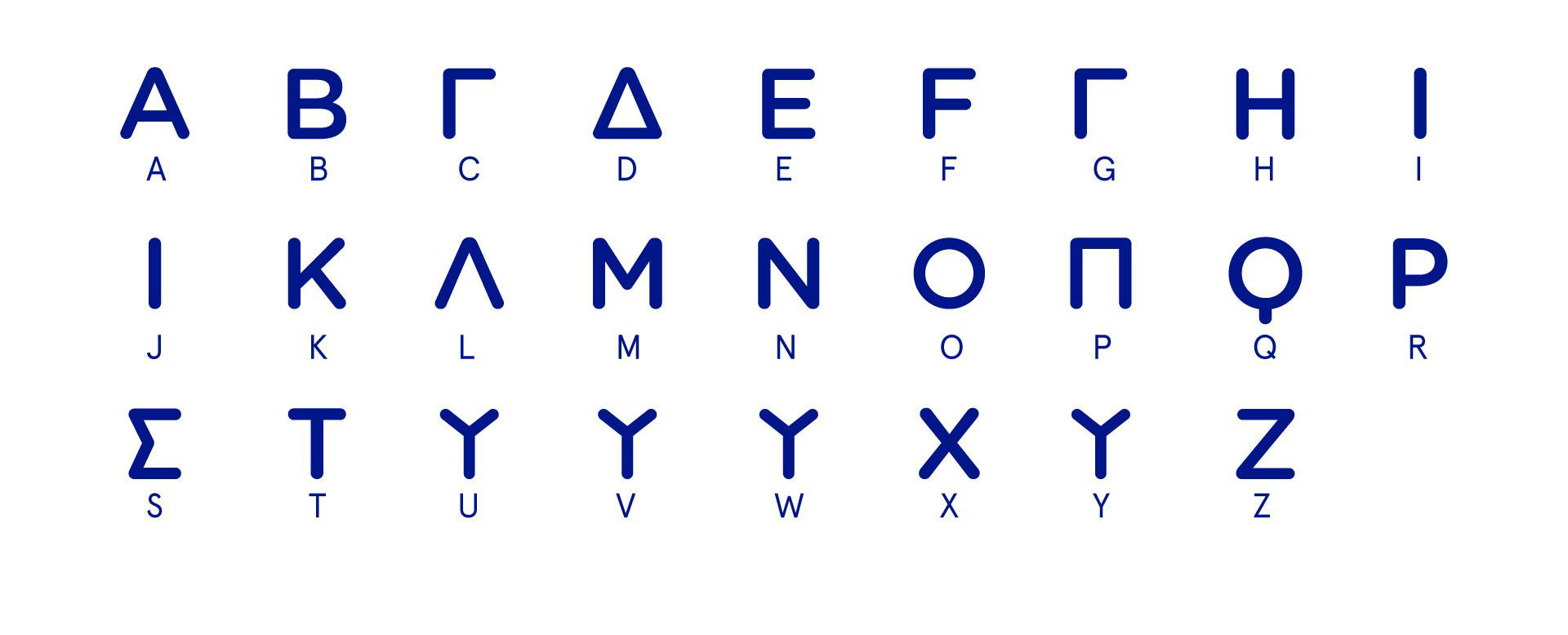
The History of the Latin Alphabet on Behance
Runic inscriptions aside, Old English was written in the Latin alphabet. But, compared to the version of the Latin alphabet used by Modern English, the Old English alphabet is missing a few letters: k, j, q, v, and z are used rarely or not at all. But Old English used a few letters we don't: þ, ð, æ, and ƿ. When were they used? Read on.
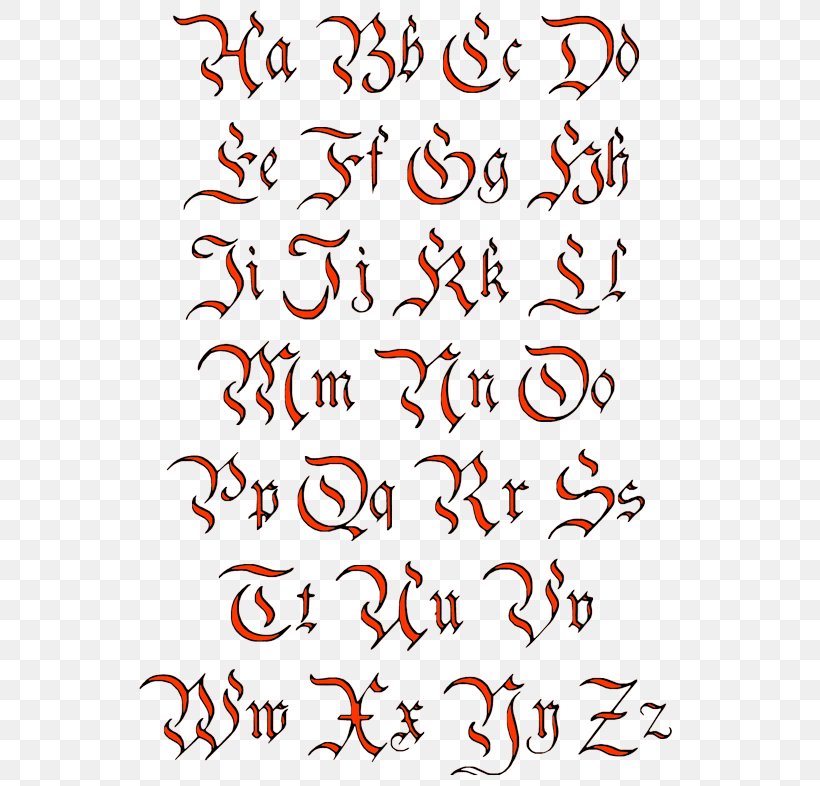
Lettering Tattoo Old English Latin Alphabet English Alphabet, PNG, 545x786px, Lettering
The Old English Latin alphabet—though it had no standard orthography—generally consisted of 24 letters, and was used for writing Old English from the 9th to the 12th centuries. Of these letters, 20 were directly adopted from the Latin alphabet, two were modified Latin letters (Æ, Ð), and two developed from the runic alphabet (Ƿ, Þ).

The Latin Alphabet History and Evolution Superprof
The Duenos inscription, dated to the 6th century BC, shows the earliest known forms of the Old Latin alphabet. The Latin script is the most widely used alphabetic writing system in the world. [1] It is the standard script of the English language and is often referred to simply as "the alphabet" in English.

The Latin Alphabet History and Evolution Superprof
English alphabet - Wikipedia Latin-script alphabet consisting of 26, each having an upper- and lower-case form. The word of the first two letters of the Greek alphabet. The alphabet originated around the 7th century to write . Since then, letters have been added or removed to give the current letters:
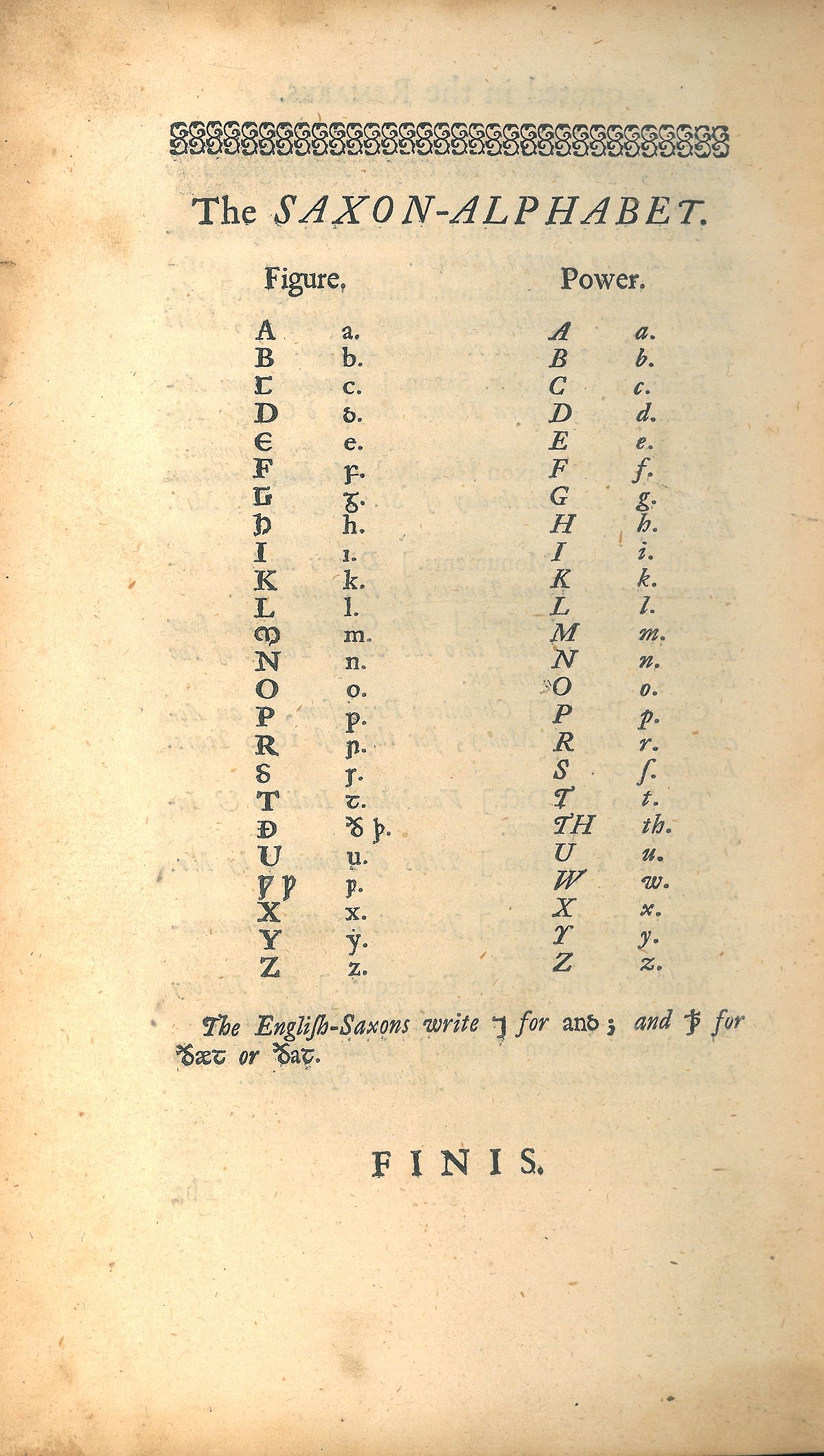
Old English Latin Alphabet Wikipedia Free Printable Old English Letters Free Printable
Old English ( Englisċ, pronounced [ˈeŋɡliʃ] ), or Anglo-Saxon, [1] is the earliest recorded form of the English language, spoken in England and southern and eastern Scotland in the early Middle Ages.

ANTIQUE LATIN ALPHABET poster Old English Script Etsy Alphabet poster, Alphabet, Lettering
ƿ ( wynn ), a runic character used for the sound we spell using w; æ ( æsc, pronounced as Modern English ash ), a vowel used to indicate the sound we now spell with a in words like bat and mat (the Anglo-Saxons also use the letter a, but only for sounds like that spelled using a in father and au in many non-Canadian pronunciations of aunt ).

Bethany Clibborn Original Latin Alphabet Letters The latin alphabet or roman alphabet is the
Classical Latin alphabet. The Classical Latin alphabet developed by the 3rd century BC. The version shown below was used for monumental inscriptions, and is known as Roman Square Capitals (capitalis quadrata) or Elegant Capitals (capitalis elegans).During the classical revival, which started in the 18th century, the letter forms of the Classical Latin alphabet, were reintroduced to the.
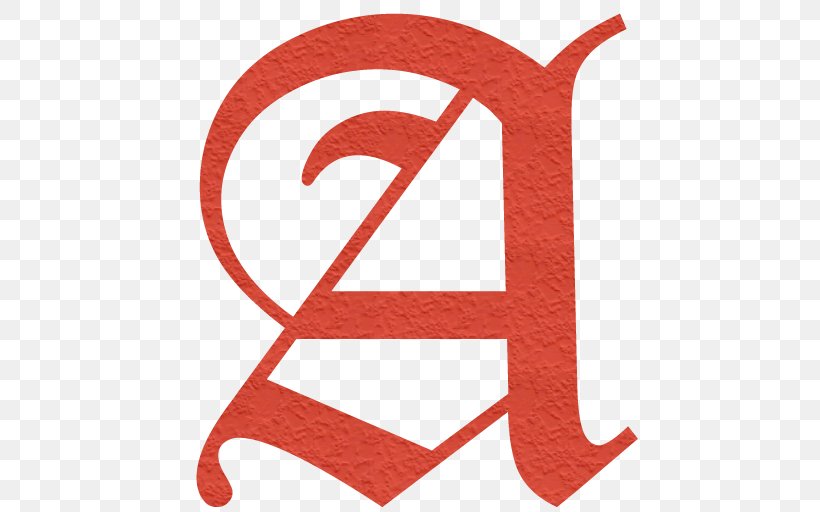
Old English Latin Alphabet Letter United States, PNG, 512x512px, Old English, Alphabet, Area
The Old English Latin alphabet generally consisted of about 24 letters, and was used for writing Old English from the 8th to the 12th centuries. Of these letters, most were directly adopted from the Latin alphabet, two were modified Latin letters (Æ, Ð), and two developed from the runic alphabet (Ƿ, Þ).The letters Q and Z were essentially left unused outside of foreign names, while the.
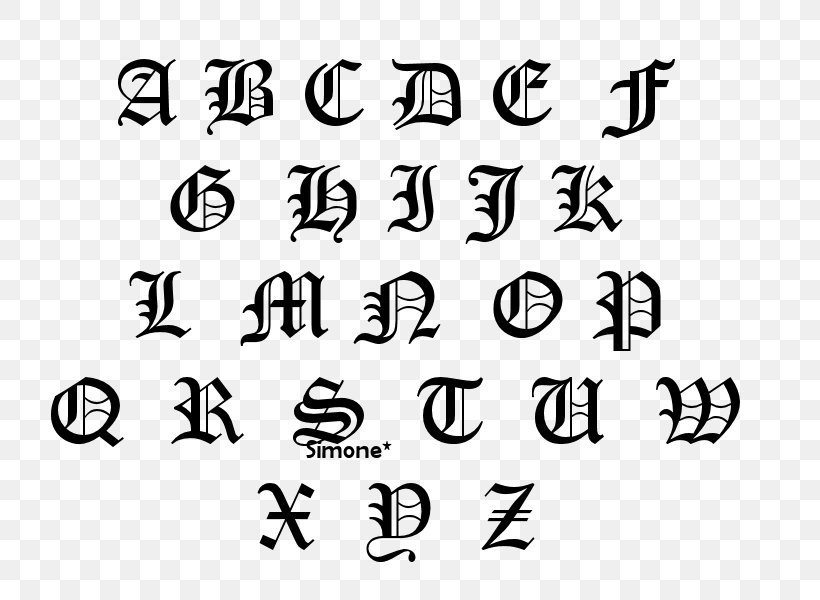
Old English Latin Alphabet Lettering, PNG, 800x600px, Alphabet, Area, Black, Black And White
"Old English" is a broad topic. For this article I'll focus on the history of Old English writing. How was Old English written? How did it change as we shifted into middle and more modern dialects? Why doesn't "count" rhyme with the first syllable of "country"?
/GettyImages-852354592-5c71dc9846e0fb0001f87ce0.jpg)
Letters of the Latin Alphabet Tracing Language History
After the 9th century, the Latin alphabet was used more often. Old English grammar is difficult, with complex inflections, and close to Old German. Latin was used by churchmen like the venerable Bede. Old English gradually turned into Middle English after the Norman Conquest of 1066. Beowulf is written in Old English in an alphabetic script.

Lettering Old English Latin alphabet Tattoo, Flash, angle, white, english png PNGWing
Roman alphabet for Latin Irish uncial alphabet Old English alphabet Modern Latin alphabet Accented letters & special characters Languages written with the Latin alphabet Ancient Latin alphabet The earliest known inscriptions in the Latin alphabet date from the 6th century BC. It was adapted from the alphabet during the 7th century BC. The.